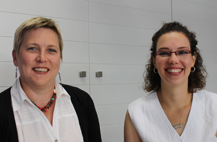Latest News Archive
Please select Category, Year, and then Month to display items
08 May 2024
Photo SUPPLIED

The Dean of the Faculty of Natural and Agricultural Sciences, Prof Paul Oberholster, has the pleasure of inviting you to the inaugural lecture of Prof Dirk Opperman.
Date: 21 May 2024
Time: 17:30
Venue: Equitas
 Click here to RSVP before Wednesday, 15 May 2024. Alternatively, contact Christelle van Rooyen on +27 51 401 9190.
Click here to RSVP before Wednesday, 15 May 2024. Alternatively, contact Christelle van Rooyen on +27 51 401 9190.
About Prof Dirk Opperman
Prof Dirk Opperman obtained his PhD in Biochemistry at the University of the Free State in 2008. This was followed by postdoctoral research on directed evolution with Prof Manfred T Reetz at the Max Planck Institute for Coal Research (Germany). In 2010, he was appointed in the Department of Microbiology and Biochemistry. He subsequently established structural biology at the UFS, and his current research focus lies at the interface of evolutionary and structure-function relationships of biocatalysts, and their application in green chemistry. He is an NRF B-rated researcher with co-authored papers in Science, Nature Communications, and Angewandte Chemie.
His research has been funded by both local and international organisations, ranging from industries such as SASOL to the Global Challenges Research Fund (GCRF, UK). He has a long-standing collaboration with researchers at the Delft University of Technology (TUDelft, the Netherlands) and is currently part of a European Research Area Network Cofund (ERA-NET Cofund) partnership on Food Systems and Climate (FOSC) that develops biocatalysts for upcycling waste.
Two Kovsie women involved in international sports events
2012-05-14
 |
|
Hetsie Veitch and Ebeth Grobbelaar
Photo: René-Jean van der Berg
14 May 2012
|
The organisers of two international sports events will depend on the expertise of two Kovsie women to make the events a major success.
The honour to be involved in international sports event has befallen Ms Hetsie Veitch and Ms Ebeth Grobbelaar.
The honour is the result of many years’ hard work and devotion in their respective fields.
In June, when the USA chooses the team to represent it at the 2012 Paralympic Games in London, Ms Veitch will be one of the classifiers who will determine in which categories athletes may compete.
Ms Veitch, Head of the Unit for Students with Disabilities at the University of the Free State (UFS), has been invited to be a member of the Classification Panel at the final USA Paralympic athletics trials. The trials take place from 27 June to 1 July 2012 in Indianapolis, Indiana, in the USA.
Ms Veitch and four other classifiers, two from Brazil, one from Canada and one from the USA, will test and verify the international classification status of the American athletes. No athlete will be allowed to take part without their classification being verified by the panel.
Ms Veitch, who recently achieved the status of International Paralympic Committee (IPC) Athletics Classifier, the highest achievement for a classifier in sport for the disabled, said that this category of sport has always been her passion.
“To have the opportunity to be involved in the classification of the USA team for the London 2012 Paralympic Games is a huge honour. I am going to start working on being chosen for the official IPC classification panel for the 2016 Paralympic Games in Brazil.”
Ms Grobbelaar, Assistant Director of the South African Testing Laboratory for Prohibited Substances at the UFS, was invited to be involved in the Drugs Control Centre in the unit against prohibited substances which will test sportsmen and women during this year’s Olympic Games in London.
Ms Grobbelaar said that even though the future of sportsmen and women would be in her hands, she is totally capable of carrying out the task that awaits her.
“I will be part of the laboratory team who will test the athletes’ samples for prohibited substances. I was part of the South African team who tested samples in our own laboratory in 2010 during the FIFA Soccer World Cup, as well as for the All Africa Games. The task is one I perform every day in our own laboratories. Each sample that I analyse determines an athlete’s future. The circumstances during the Olympic Games are different, but the work remains the same.”